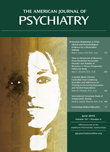Impairment of Phosphatidylinositol 3-Kinase Signaling in Schizophrenia: State or Trait?
To the Editor: In their article, published in the April 2010 issue of the Journal, Szabolcs Kéri, M.D., Ph.D., D.Sc., et al. (1) showed that neuregulin 1-dependent activation of phosphatidylinositol 3-kinase signaling was impaired in schizophrenia patients, which was connected to P50-evoked response and thereby influenced sensory gating in patients with first-episode schizophrenia. Phosphatidylinositol 3-kinase and phosphoinositide-dependent protein kinase-1 signaling inhibit glycogen synthase kinase-3β. Our workgroup found increased anxiety behavior in phosphoinositide-dependent protein kinase 1 hypomorphic mice (2) and stress-resistant behavior in glycogen synthase kinase-3β knock-in mice, supporting the role of phosphatidylinositol 3-kinase signaling in anxiety and stress (3). However, Dr. Kéri et al. did not examine the influence of neuroleptic treatment on phosphatidylinositol 3-kinase activity. The highly effective atypical antipsychotics olanzapine and clozapine in contrast to haloperidol have been shown to activate the protein kinase B (AKT) glycogen synthase kinase-3β axis (4). These effects might explain heterogenous findings on the P50-evoked response in schizophrenia patients, which seems to normalize after treatment with clozapine and olanzapine but not after typical drugs (5).
1 : Suppression of the P50 evoked response and neuregulin 1-induced AKT phosphorylation in first-episode schizophrenia. Am J Psychiatry 2010; 167:444–450 Link, Google Scholar
2 : Phosphatidylinositide dependent kinase deficiency increases anxiety and decreases GABA and serotonin abundance in the amygdala. Cell Physiol Biochem 2008; 22:735–744 Crossref, Medline, Google Scholar
3 : Hyperactivity and enhanced curiosity of mice expressing PKB/SGK-resistant glycogen synthase kinase-3 (GSK–3). Cell Physiol Biochem 2010 (in press) Crossref, Google Scholar
4 : Early effects of mood stabilizers on the Akt/GSK-3beta signaling pathway and on cell survival and proliferation. Psychopharmacology 2009; 205:419–429 Crossref, Medline, Google Scholar
5 : Normal P50 suppression in schizophrenia patients treated with atypical antipsychotic medications. Am J Psychiatry 2000; 157:767–771 Link, Google Scholar



